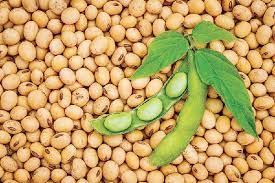Member of Parliament for Keta, Kwame Dzudzorli Gakpey, has called for the review of the Legislative Instrument (L.I) that regulates the export of soya beans from the country.
Speaking on the Super Morning Show, on Monday, the MP, who is a Member of the Parliamentary Select Committee on Agriculture said the ’Export and Import- restriction of soya bean regulation 2020 (L.I 2432) is outdated.
He explained that the legislation has not served the purpose for which it was instituted since illegal export of soya beans, is still rampant in the country, thus, the need for Parliament to review it.
“Though there is an existing LI regulating the export of grains, recently the Agric Ministry has inaugurated a Grains Development Board that will also ensure the LI is enforced, which is in a good direction, but for me, the LI is outdated and as a Parliament, we need to work on that,” he said.
Discussions on the Super Morning Show centered on Ghana's Soya Bean industry, following the JoyNews documentary “The Broken Chain” which exposes the shortfalls in the supply of soya bean in the country.
The documentary has revealed that the local poultry industry is collapsing because there is short supply of soya bean and maize, which are the main components of feed for the birds. The shortage in supply of soya beans to the local poultry industry is not a result of low production levels for soya beans. Instead, the sale of soya beans to foreign buyers.
Data suggests that there has been a tremendous increase in the export of soya bean from Ghana. This has resulted in competition amongst exporters while creating shortage of the commodity for use by the livestock and poultry industry. The situation has been compounded by price hikes, making it expensive for local processing.
As part of efforts to resolve the situation, the Parliament passed legislation on October 15, 2020, to regulate the export of soya beans from the country which came into force on December 22, 2020.
The purpose of the regulation is to provide licensing systems for the export of soya beans for commercial purposes. It was also established to regulate the exportation of soya beans from the country and ensure the availability of soya beans for domestic use to meet local processing requirements for animal production. But about two years later, soya beans farmers continue to lament over the export of commodity to exporters at the expense of the local industry.
Almost 90 percent of large-scale soya beans processing factories in Ghana have shut down because they are not getting the required quantities of the product to process.
This has resulted in close to a thousand workers in these factories being laid off. Some of the farmers have blamed the development on the government's flagship planting for food and Jobs programme.
Commenting on the development, the MP criticised the initiative, describing it as a failure.
He believes that if the government’s flagship programme is working efficiently as expected, there is no need for a legislation that will restrict exports since the country needs foreign exchange for development.
“The thematic areas for government’s flagship programme, planting for food and jobs is to subsidise fertilizer, subsidise Agric inputs and it is also aimed at creating jobs and when jobs are created through this initiative, we’re supposed to produce a lot and then to enable Ghana to export those grains for foreign exchange which will bring a lot of earnings to the country. So for me, if planting for food and jobs is working well, there is no way that LI should be in force, because we need foreign exchange for the country to develop,” he stated.
Latest Stories
-
Measures announced in Mid-Year Budget Review fully in line with programme objectives – IMF
5 seconds -
This Saturday on Newsfile: AG drops charges in uniBank trial, Aud-General’s report, and Mid-Year Budget Review
21 minutes -
Parliament passes Road Maintenance Trust Fund Bill
51 minutes -
Heavy security deployed at Manhyia Palace following Asawase shootings
55 minutes -
Kumawu MP Ernest Anim urges Parliament to act on crisis in Ghana’s prisons
1 hour -
Kumawu MP decries ‘Inhumane’ feeding rate in Ghana’s prisons
2 hours -
Mahama appeals for calm in Nkwanta, condemns recent killings
3 hours -
Ghana Career and Migration Fair 2025 launched to prepare youth for the future of work
3 hours -
Mfantsiman Old Girls’ Association to hold National Health Walk on August 2
3 hours -
Ecobank-JoyNews Habitat Fair opens in Tema with three-day housing clinic
3 hours -
I’ll use my legal experience to support Ghana’s consular diplomacy – Gyakye Quyason
3 hours -
A/R: 2 killed, three injured in suspected targeted shooting at Denase
3 hours -
Alsale Services joins JoySports Invitational Tournament 2025
3 hours -
A/R: One dead, soldier injured in bus shootout
3 hours -
Ashanti REGSEC bans motorbike operations after 7pm following Kusaase chief killing
3 hours

